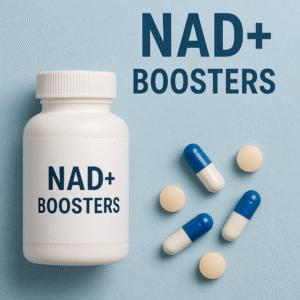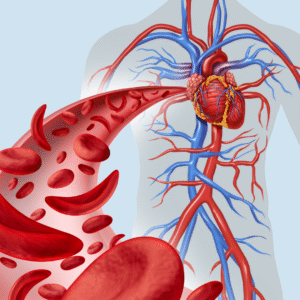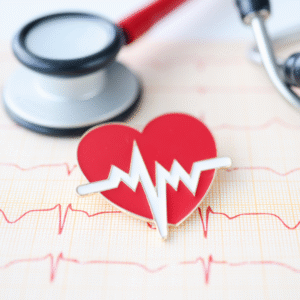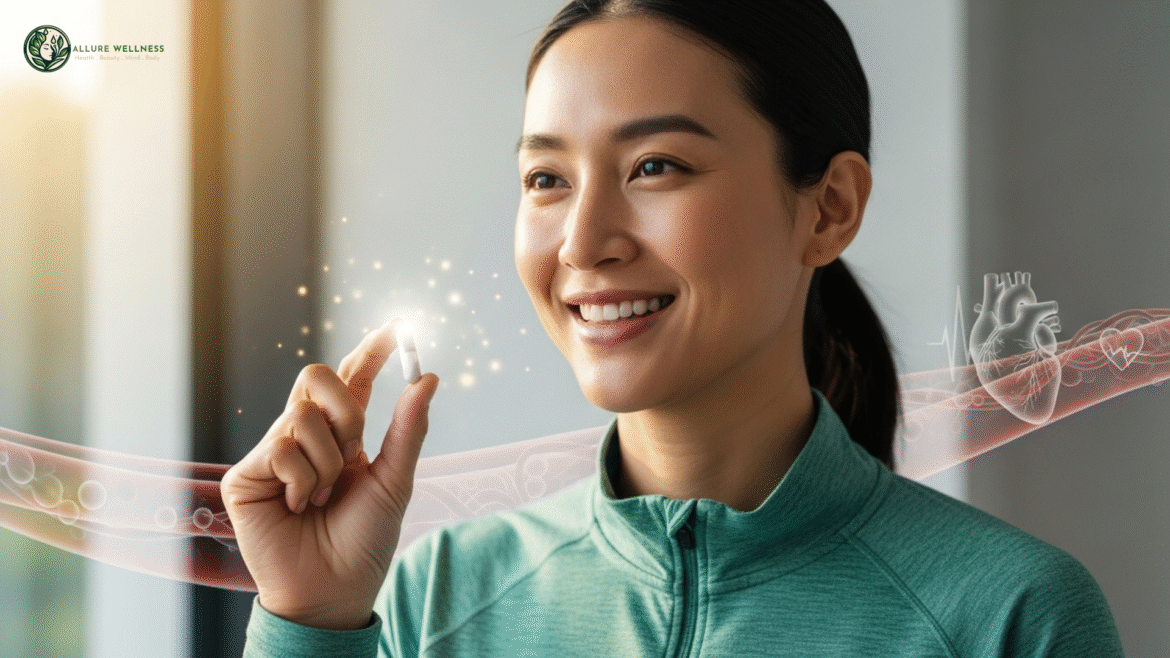As the years pass, our hearts and blood vessels quietly work harder to keep us healthy. Yet age naturally brings changes that challenge cardiovascular health. Arteries stiffen, circulation slows, and the heart muscle faces more strain. It’s no wonder more people are looking for ways to support their heart as they grow older.
Lifestyle habits—like regular exercise, a balanced diet, and good sleep—remain the foundation of a strong heart. But lately, emerging supplements have sparked excitement. One of the most talked-about is NMN, or nicotinamide mononucleotide. Scientists are exploring whether this small molecule could help keep blood vessels youthful and circulation strong. Can a simple molecule really help your heart age more gracefully? Let’s take a closer look.
Highlights
- NMN may support cardiovascular health by boosting NAD+ levels, improving blood flow, and maintaining flexible, healthy blood vessels.
- Early research suggests NMN can help reduce oxidative stress, support endothelial function, and enhance heart muscle energy via mitochondria.
- NMN works best alongside lifestyle habits like regular exercise, a balanced diet, quality sleep, and stress management for overall heart-healthy aging.
Table of Contents
NMN 101: Fuel for Your Cells
 Think of NMN as a building block. In simple terms, it is a compound naturally found in our bodies and in small amounts in foods like edamame, broccoli, and avocado. NMN’s main role is to help produce NAD+ (nicotinamide adenine dinucleotide), a coenzyme present in every cell.
Think of NMN as a building block. In simple terms, it is a compound naturally found in our bodies and in small amounts in foods like edamame, broccoli, and avocado. NMN’s main role is to help produce NAD+ (nicotinamide adenine dinucleotide), a coenzyme present in every cell.
NAD+ is like a battery pack for your cells. It powers energy production, supports DNA repair, and keeps essential processes running. Unfortunately, NAD+ levels decline as we age. This drop is linked to fatigue, slower cell repair, and—yes—changes in heart and blood vessel health.
By boosting NAD+ levels, NMN may help cells, including those lining blood vessels and heart tissue, function more efficiently. That’s where the NAD+–cardiovascular connection begins: healthier cells mean stronger, more flexible vessels and a heart better equipped to handle the years ahead.
How Aging Challenges Your Heart and Blood Vessels
As we grow older, our cardiovascular system faces a trio of changes:
- Loss of vascular flexibility. Arteries naturally become stiffer with age. This reduces their ability to expand and contract as blood flows, making it harder to maintain healthy circulation.
- Common age-related issues. Poor circulation, arterial stiffness, and rising blood pressure often creep in over time. These changes increase the risk of heart disease and other complications.
Why vessel health matters.
Your blood vessels are like highways delivering oxygen and nutrients. When they lose elasticity or suffer damage, every organ feels the impact. Supporting vessel health is, therefore, key to staying energetic and active well into later life.
4 NMN’s Potential Cardiovascular Benefits
 Research is still unfolding, but early evidence suggests that NMN may deliver several heart friendly effects. These potential benefits revolve around supporting healthy circulation, protecting blood vessels, and maintaining the heart’s energy supply as we age.
Research is still unfolding, but early evidence suggests that NMN may deliver several heart friendly effects. These potential benefits revolve around supporting healthy circulation, protecting blood vessels, and maintaining the heart’s energy supply as we age.
1. Improved blood flow and circulation.
Preclinical research and small human trials indicate that NMN supplementation can enhance microcirculation—the network of tiny capillaries that deliver oxygen and nutrients to every cell. When microcirculation functions well, tissues receive the fuel they need and metabolic waste is removed more efficiently. This is crucial because sluggish blood flow can lead to fatigue, slower healing, and a higher risk of heart-related problems. By helping sustain this fine-tuned delivery system, NMN may promote a steady, youthful flow of blood throughout the body.
2. Supporting endothelial function.
The endothelium, the delicate inner lining of blood vessels, plays a key role in controlling vascular tone and blood pressure. A healthy endothelium produces nitric oxide (NO), a natural molecule that signals blood vessels to relax and widen. As we age, nitric oxide production often declines, which can contribute to rising blood pressure and stiffened arteries. Early findings suggest that NMN boosts NAD+ levels within endothelial cells, which may help preserve NO production. This, in turn, supports flexible blood vessels and smoother, more stable circulation.
3. Combating oxidative stress and inflammation.
Aging is often accompanied by oxidative stress—the accumulation of damaging free radicals—and low-grade chronic inflammation. Together, these processes can injure the walls of blood vessels, hasten plaque buildup, and increase the risk of cardiovascular disease. By raising NAD+ levels, NMN appears to help cells activate natural repair pathways and antioxidant defenses. This may reduce cellular damage, limit inflammatory signals, and protect arteries from long-term wear and tear.
4. Heart muscle and mitochondrial health.
 Your heart is a tireless engine, beating about 100,000 times a day. To keep up this effort, heart muscle cells rely on mitochondria, the energy generators inside every cell. Over time, mitochondrial function can weaken, leading to reduced energy output and decreased resilience of the heart muscle. NMN has shown potential to improve mitochondrial efficiency by supporting NAD+-dependent enzymes that drive energy production. Stronger, more efficient mitochondria mean the heart can pump blood more effectively and recover from daily stress more easily.
Your heart is a tireless engine, beating about 100,000 times a day. To keep up this effort, heart muscle cells rely on mitochondria, the energy generators inside every cell. Over time, mitochondrial function can weaken, leading to reduced energy output and decreased resilience of the heart muscle. NMN has shown potential to improve mitochondrial efficiency by supporting NAD+-dependent enzymes that drive energy production. Stronger, more efficient mitochondria mean the heart can pump blood more effectively and recover from daily stress more easily.
In short, NMN may help the cardiovascular system age more gracefully by supporting blood flow, preserving vessel flexibility, reducing oxidative damage, and energizing the heart itself. While further large-scale human studies are needed, these early insights point to NMN as a promising ally for long-term heart health.
What the Research Says
Preclinical research is promising. Animal studies consistently show NMN improving vascular health and endurance. For example, older mice given NMN demonstrated improved blood vessel function and better blood flow.
Human data, while limited, is growing. Early trials report increased NAD+ levels and potential benefits for insulin sensitivity and vascular function. However, these studies often involve small groups and short timelines. Experts agree that larger, long-term trials are needed before NMN can be recommended as a proven therapy.
Still, the scientific momentum is encouraging. Many researchers see NMN as a key player in the future of healthy aging research.
Supporting Circulation with NMN and Healthy Habits
Adding NMN to your routine works best when it’s part of a bigger heart-healthy lifestyle. Supplements can give your cells extra support, but everyday habits still matter most. Here’s how you can pair NMN with proven circulation boosters.
| Area | Key Points | How to Combine With NMN |
| Suggested dosage and forms | Early studies have explored 250–500 mg per day, usually as capsules or powder. There is no official recommended dose yet. | Take NMN only under medical guidance, especially if you have existing health conditions or are on prescription medication. Your doctor can help you decide if NMN fits your heart-health plan. |
| Lifestyle synergy | NMN works best alongside regular exercise, balanced nutrition, good sleep, and stress management. | • Exercise + NMN: Brisk walking, cycling, or swimming enhances NMN’s potential to support blood flow. • Sleep & Stress + NMN: 7–9 hours of quality rest and relaxation practices such as meditation reinforce NMN’s role in cellular repair. • Other nutrients + NMN: CoQ10 or omega-3s (with professional advice) may complement NMN for overall cardiovascular support. |
Safety and Possible Side Effects
Current studies suggest that NMN is generally well tolerated. Reported side effects are mild, such as digestive discomfort in some users. But because research is still in its early stages, long-term effects remain unknown.
People with chronic illnesses or those taking medications for heart disease, diabetes, or blood pressure should consult a healthcare professional before trying NMN. It’s always best to avoid self-prescribing.
Other Natural Ways to Boost Circulation
NMN isn’t the only path to better blood flow. Simple habits make a big difference:
- Move more. Regular physical activity—walking, swimming, dancing—keeps blood vessels flexible.
- Maintain healthy blood pressure. Monitor it regularly and manage it through diet and stress reduction.
- Eat circulation-friendly foods. Flavonoid-rich berries, dark chocolate, and nitrate-rich vegetables like beets and leafy greens naturally support nitric oxide production.
- Stay hydrated and manage stress. Drinking enough water and practicing relaxation techniques like meditation help keep your heart in balance.
Conclusion: A Balanced Approach to Heart-Healthy Aging

NMN offers exciting possibilities for keeping your blood vessels youthful and supporting circulation as you age. By raising NAD+ levels, it may help combat arterial stiffness, oxidative stress, and declining endothelial function.
But remember, NMN is not a magic pill. The foundation of cardiovascular health remains a mix of regular exercise, nourishing food, restful sleep, and stress management. Supplements like NMN can be a helpful addition, but they work best as part of a holistic plan.
Before adding NMN to your routine, talk to your doctor. A personalized plan ensures your heart—and your entire body—ages as gracefully as possible.
Frequently Asked Questions (FAQs)
How soon can I feel NMN’s effects on circulation?
Human studies are still limited, so there is no clear timeline. Some people report more energy within weeks, but measurable heart benefits may take months and more research is needed.
Can NMN lower blood pressure?
Early research suggests it may help support healthy blood pressure by improving vessel function, but it is not a replacement for prescribed medication.
Is NMN safe to take daily?
So far, studies using moderate doses have not found serious side effects. Still, consult your healthcare provider for guidance.
Do I still need exercise and a healthy diet if I take NMN?
Absolutely. NMN works best alongside regular movement, balanced nutrition, and good sleep. Supplements cannot replace healthy habits.

